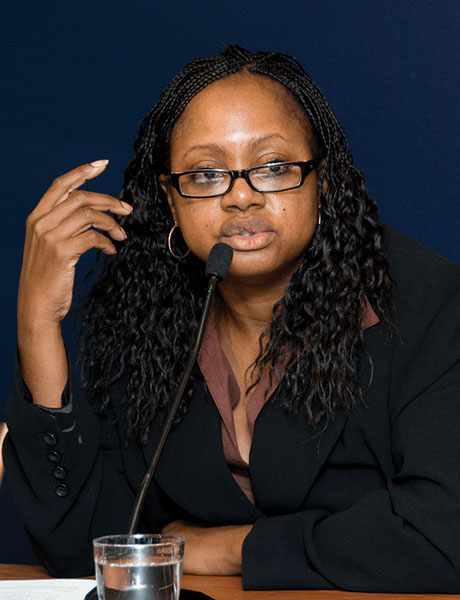In Pursuit of Peace

In August 2017, President Donald Trump’s national security adviser, H.R. McMaster, said, “it’s impossible to overstate the danger” posed by North Korea. He was referring to both the Communist nation’s leader, Kim Jong Un, as well as to its nuclear-weapon capabilities. The United Nations has adopted a series of resolutions sanctioning North Korea for its continuous firing of ballistic missiles; some cut more than 55 percent of refined petroleum products, including gasoline, going to the country. But the military threat to the United States persists. What can be done?
We asked Bonnie Jenkins, M.P.A.’88, a nuclear-weapons policy expert who, until January 2017, was coordinator for threat-reduction programs at the U.S. Department of State under President Barack Obama. Since last May, Jenkins, a board member of the Arms Control Association, has been a joint visiting fellow at the University of Pennsylvania Perry World House and the Brookings Institution, a Washington, D.C., think tank. UAlbany’s Rockefeller College of Public Affairs & Policy presented her its 2013 Distinguished Alumna Award in Public Administration and Policy.

Jenkins acknowledged that while Obama was president, North Korea continued to pursue a nuclear weapon that can strike the United States. But she offered a rather pessimistic view of the situation as of mid-October 2017.
You worked in President Barack Obama’s administration, which employed a “strategic- patience” policy of gradually escalating sanctions with North Korea, but North Korea has continued to pursue nuclear weapons. How would you assess the success of that policy?
There are not a lot of great options, other than continue to use sanctions against North Korea, until you find a better way to try to deal with the situation – unless countries decided to negotiate. Has it been successful? No, because I think North Korea, for several reasons, wanted to develop a nuclear weapon, and one that can reach the U.S. Obviously, they’re feeling the sanctions, but not enough to stop their weapons development. They would rather have people suffer than give up their weapons. On the other hand, we’ve found some illegal transfers North Korea employed to get some money into their country, so the sanctions are having an effect – just not the effect that we want.
President Trump has suggested that a U.S. military response is on the table. How do you assess his policy toward North Korea?
The military response is always an option; it just may not be articulated as on the table and, obviously, you use that articulation when you think it’s going to be valuable … to get you what you want. But what’s the strategy? President Trump has obviously been a lot more willing to use more contentious language; it’s definitely not a wait-and-be-patient situation. It’s also Trump trying to be different from Obama and trying to give a sense that “I’m going to make the world different.” The problem is, I don’t know if it’s making the world different; it’s just creating a lot of confusion. Obviously, North Korea is not being persuaded by all the harsh rhetoric. It sets up a more glaring and difficult situation. When you raise the stakes like this and you still don’t have a way to get the threat escalation to stop, it makes more folks upset, but you still don’t have an answer.
What steps do you think should be taken to reduce the threat North Korea poses to the United States?
The first thing is to reduce the tension, because you’re not going to have anything happen if both sides are glaring at each other. You have a country that is obviously not going to be cowered by the U.S. And Kim Jong Un can also see the problems that Trump is having being president. So, unless we do something different, like diplomacy, I don’t see him necessarily saying, “I’ve got to run because the United States is after me.”
Make it a situation where you can possibly have a way forward. But you have to have a strategy; I don’t see a strategy. There’s no effort I see to significantly work with the other partners to develop a strategy. We’re very much out there by ourselves. We’re not really working with China and Japan and South Korea and Russia to try to find a way forward. The way it is now, it’s not really going anywhere; it’s just kind of stuck. We’re kind of putting ourselves in a corner.
Tom Kertscher, a PolitiFact Wisconsin reporter for the Milwaukee Journal Sentinel, wrote about fake news for the Fall 2017 UAlbany. Follow him at
TomKertscher.com and on Twitter: @KertscherNews and @KertscherSports.